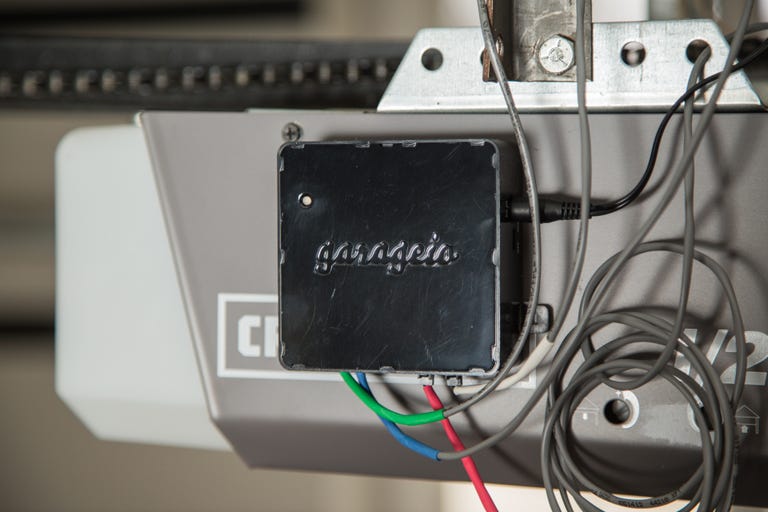 Why You Can Trust CNET
Why You Can Trust CNET Garageio review: Garageio is the smartest garage door opener yet
Garageio tests the boundaries, opening the door to tools like geofencing and voice control.
When you hear the phrase "garage door opener," you probably think of the little black-and-gray remote clipped to the sun visor in your car -- that thing that controls your garage door opener. But over the last few years, major developers like Chamberlain, and smaller ones like Garageio in Columbus, Ohio, have begun to market app-connected garage door openers.
The Good
The Bad
The Bottom Line
Garageio's self-named device is a relatively simple black box that hardwires into your current garage door opener. From there it integrates with platforms like Amazon Echo and IFTTT -- the app that builds triggers between normally unconnected apps and devices. Despite its clever integrations, Garageio still doesn't feel quite slick enough to pull off its $199 base price (not to mention an extra $10 for each additional garage door, up to three).
For anyone ready to get their garage into the smart-home mix, Garageio is a pretty solid buy. But until its app gets a little deeper and its integration smooths out, this product isn't ready for everyone.
How smart can a garage door be?
Installing Garageio is a little more involved than I'd prefer (more on that later), but once the system is up and running, app connection is simple. In fact, it's a little too simple. When you open the app, the interface is an orange garage door that you swipe up to open or swipe down to close. It works, but for $200 I'd like to see an app with more to offer. Luckily Garageio introduces new features elsewhere.
Integrations with Amazon Echo and IFTTT are a breeze to set up, and they're the main distinction Garageio can claim from competitors like the Chamberlain MyQ. With Garageio, you can control your garage doors with a voice command, or trigger them to open via geolocation through the IFTTT app.
With Amazon Echo, you can send commands and ask questions of Garageio.
Disappointingly, these two integrations aren't equally slick. IFTTT integration is mostly open to your imagination, but Amazon Echo's commands are basic and sometimes frustrating to use. Since Echo's Garageio skill isn't native, you can't just ask Alexa to open your garage. You have to say things like, "Alexa, tell Garageio to open my small garage door," or "Alexa, ask Garageio if my garage doors are open." After a while, it felt like I was having a middle school feud with Garageio, and Echo was just caught in the crossfire.
IFTTT, on the other hand, works wonders. In fact, without IFTTT, I would like Garageio much less than I do. But automating your garage door with geofencing or other triggers might create some safety questions. Chamberlain, Garageio's biggest competitor, actually refuses to work with triggering platforms like IFTTT so users don't accidentally open their garage doors while they're away.
This is an interesting question: Should security be left up to users, or controlled by developers? As long as you're careful with IFTTT, you should be fine. Keep integrations clear-cut, and don't use anything that isn't normally associated with garage doors to trigger them (e.g., if I send an email, open the garage door). And if you are careful, then the automation possibilities do elevate Garageio above its competition.
The new black (box)
Garageio is simple to attach to your existing garage door opener, and the wiring is (mostly) straightforward.
Garageio's design works. Yes, installation involves fiddling with tape, wires and screwdrivers, all while perched on a stepladder. And yes, it'll take a lot longer than the 15 minutes per door the website advertises (it took me about two hours to install it on two doors). But the wires and inputs on the black box are clearly labeled, and the online directions are relatively straightforward and visual.
You can also double up the Garageio's wiring on top of any existing wires you have. That means you get to keep any buttons you've wired around your home to manually control your garage doors
I ran into two issues while setting up Garageio. First, while Garageio provides lists of compatible and incompatible makes and models (to help personalize instructions), those lists are incomplete. The Chamberlain opener on one garage door at the CNET Smart Home is on the compatibility list, but the Craftsman model on the other door is not, so it required a little guesswork for installation. Luckily it worked, but I'd like to see more comprehensive installation support for users.
The second issue with installation was the wires themselves. Garageio includes abundant wiring for any installation needs, but only adds some plastic clips to secure those wires. For a setup that holds rolls of wire over a moving chain that could easily jam, I'd like to see some more reliable supplies included in the box.
This is where Chamberlain's all-wireless installation has an edge over Garageio. It's faster and easier to set up, and there's no risk of jamming.
The verdict
For many smart-home aficionados or Amazon Echo users, getting your garage to open automatically when you drive up, or getting Alexa to control it, is worth Garageio's $200 price tag, and justifies its premium over the less capable, $129 MyQ from Chamberlain. For me personally, IFTTT compatibility is the strongest recommendation for Garageio. I just want to see a deeper app, and native control through Amazon Echo. It's far ahead of its competition in terms of its programmability, but even there, Garageio still has room to improve.


